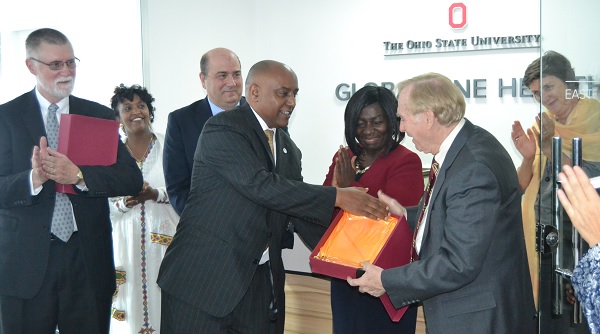
The Ohio State University’s Global One Health initiative is working to address infectious disease and other non-communicable disease in Eastern Africa, using a One Health approach.
(OSU News)–Each year, thousands of Ethiopians are infected with rabies, and many die from it. According to the U.S. Centers for Disease Control and Prevention, Ethiopia reports the highest number of rabies deaths in the world, yet it is an underestimation because countless cases go undetected and untreated.
In fact, in 2016, new research documented that Ethiopia had one of the highest infection rates for zoonotic diseases (transmissible from animals to humans), such as brucellosis, rabies, anthrax and others. Ethiopia is not alone in these rates – other Eastern African countries also suffer from the burden of mortality and morbidity from these illnesses.
The common link among these infectious diseases, and others including Zika or Ebola, is that they occur at the interface of humans, animals and the ecosystem. One Health is a method approach to combat diseases that occur at this interface with a comprehensive system involving research, policy and practice.
The Ohio State University’s Global One Health initiative (GOHi) is working to address infectious disease and other non-communicable disease in Eastern Africa, using a One Health approach.
“The future of One Health is becoming more and more critical because of current global dynamics. The human population is projected to reach 9.6 billion by 2050, and that is associated with increased urbanization and deforestation,” says GOHi Executive Director, Professor Wondwossen Gebreyes. “All of those factors have potential to increase the devastating impact of disease.”
On November 11, GOHi hosted opening ceremonies for its new regional Eastern Africa office in Addis Ababa. This office will enable GOHi to better address the issues of One Health in the region. Numerous dignitaries from Ethiopia, Kenya, Tanzania, the United States and The Ohio State University joined the GOHi team for a ceremony officially christening the new office and celebrating its registration as an international NGO by the Ethiopian Charities and Societies Agency.
GOHi has been working with universities (>7), NGOs and relevant government offices across Eastern Africa for the last nine years and is focused on addressing One Health via research, training and the application of best practices in public health. This summer alone, GOHi vaccinated over 8,000 dogs in Addis Ababa; trained over 70 physicians and public health practitioners in One Health from Ethiopia, Tanzania and Kenya; and enrolled more than 800 HIV-positive participants in a TB prevention research trial with USAID/KNCV/AURUM to improve the current prevention strategy for TB because it is the number one killer among HIV-positive patients.
GOHi is working to reduce the global risks related to other diseases and critical health issues, including antibiotic resistance stemming from antibiotic overuse and misuse, through research, policy and practice.
The regional office will serve as a central foundational location to coordinate efforts between Ohio State and the Eastern Africa region, with a focus primarily on One Health activities.
“By pursuing NGO registration, we have demonstrated our lasting commitment to the One Health mission in Eastern Africa,” Gebreyes said, “enabling our engagement with the citizens of Ethiopia, Kenya, Tanzania and others to take on a whole new dimension while providing sustainable opportunities for scholarly activities by the Ohio State community.”
Source: GOHi
——
Other stories:
- Novartis, ASCP and ACS Join Forces to Fight Cancer in Ethiopia, Uganda and Tanzania
- Addis Ababa University, Kyoto University (Japan) to Cooperate in Research, Postgraduate Programs
- University of Gondar Officially Launches Partnership with Queen’s University, MasterCard Foundation
- Jimma University, Chinese Academy of Sciences (CAS) Institute of Microbiology to Begin Mutual Collaboration
- Transforming Health Care in Ethiopia: A Collaboration between the University of Toronto and Addis Ababa University
